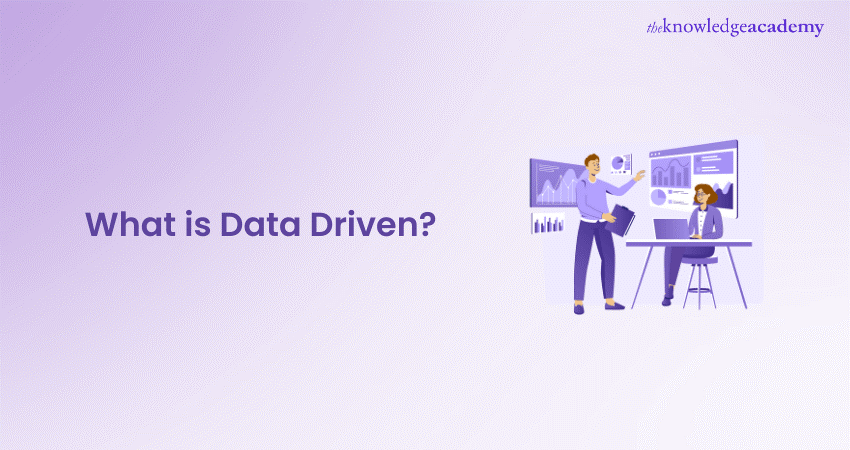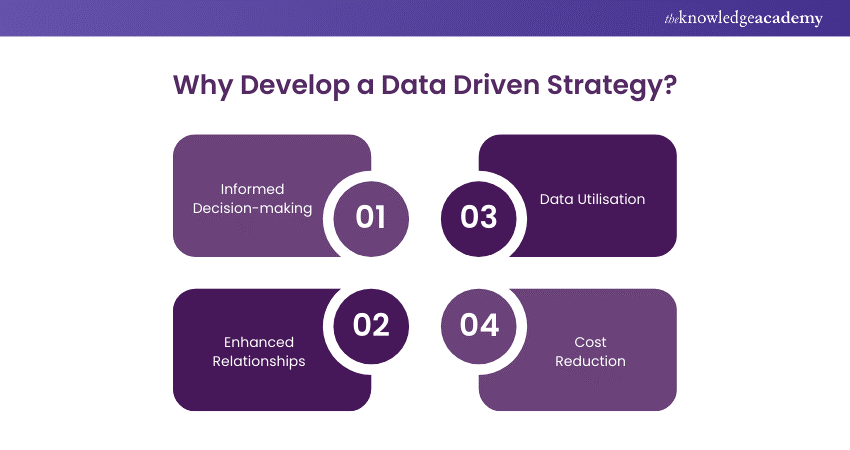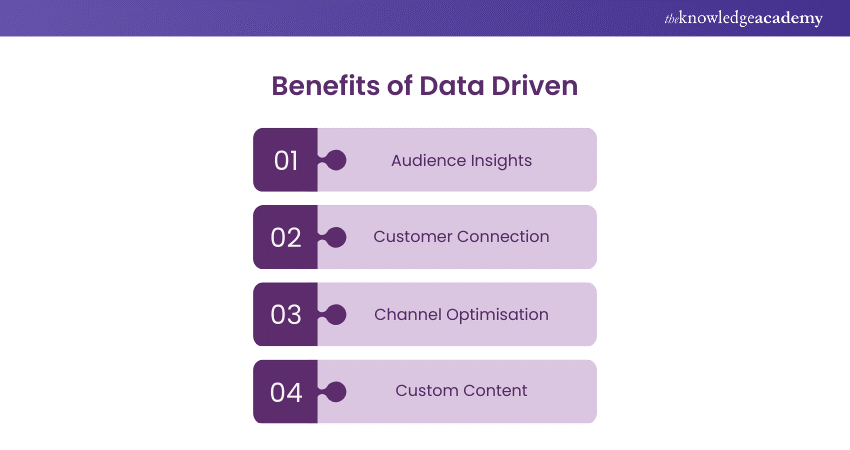We may not have the course you’re looking for. If you enquire or give us a call on +44 1344 203 999 and speak to our training experts, we may still be able to help with your training requirements.
Training Outcomes Within Your Budget!
We ensure quality, budget-alignment, and timely delivery by our expert instructors.

What if we told you that you could derive valuable, success-driven insights and conclusions from the millions of gigabytes of data generated every day? That's the power of Data Driven decisions! As per the recent survey by Harvard. 91.9% of the respondents have admitted that Data Driven was a critical factor in their organisational transformation. In this blog, we'll shed light on What is Data Driven, its importance, benefits, and associated challenges. It’ll be an intriguing blog, so we recommend to you read thoroughly. Wasting no time, let’s dive in!
Table of Contents
1) What is Data Driven?
2) Why is Data Driven Important?
3) Why Develop a Data Driven Strategy?
4) How to be Data Driven?
5) Benefits of Data Driven
6) Challenges Associated With Data Driven Methodologies
7) Conclusion
What is Data Driven?
Data Driven is the combination of strategies implement by the business to perform critical business decisions or to solve problems based on conclusive data and information than relying on intuition and guesswork.
For instance, imagine you are the CEO of an organisation, and you've noticed a decline in profits over the past few months. In a generalised perspective, you assume that it's due to a lack of performances in employees. So, you started replacing your existing employees with newer staff, which takes considerable time, money, and efforts to advertise the job and onboarding.
In contrast, through Data Driven evidence, you noticed that your employees weren't getting enough pay, which was why they weren’t performing to their full potential. So, you increased their wages, which raised your organisation's profitability.
Why is Data Driven Important?
A business is a complex entity, and decisions can’t be made solely based on guesswork or insights from employees. It necessitates a strategic approach where, in some cases, you might need to present reports and spreadsheets during meetings to support your findings.
Without conclusive evidence, your planning could fail to impress the stakeholders, resulting in substantial losses.
For this reason, the vitality of Data Driven approaches has increased over the last few years. Additionally, this trend is expected to grow as time progresses.
Transform your data analytics prowess with Google Analytics Certification!
Why Develop a Data Driven Strategy?
Data Driven strategies are an asset to any organisation. They help to attain optimal profitability and critical business goals through concrete and well-analysed evidence. Check the below pointers to discover the key reasons behind implementing these strategies.

1) Informed Decision-making
Data Driven strategies allow businesses to make the best decisions by anticipating different hypotheses (predictive analysis). Additionally, it helps them reduce the related risk factors.
2) Enhanced Relationships
Businesses can gain a better understanding of their target, which helps them address their customers' issues more personally and enhance the effectiveness of their campaigns.
3) Data Utilisation
Businesses can efficiently analyse competitors' products and develop products that fit their customers' needs, providing them with competitive advantages in the ever-evolving landscape.
4) Cost Reduction
Implementing Data Driven strategies can lead to significant cost savings by optimising operations and reducing unnecessary expenditures.
How to be Data Driven?
Emphasising data-backed decisions helps businesses be more precise, agile, and competitive. Here are ways you can embrace this cutting-edge approach.
1) Data Collection
Start by gathering information from multiple sources, such as customer behaviour, sales figures, and website analytics. Utilise standard techniques, such as surveys, interviews, and observational studies, commonly taught in business improvement courses. Ensure the data collected are from authentic websites and organisational stakeholders to maintain accuracy and reliability in your analysis.
2) Data Access
After collecting the necessary data, you should ensure it is accessible to all the organisation's employees. This allows you to request additional information if needed and fosters a collaborative ecosystem within the organisation.
3) Generate Reports
Without reports, the data is the same as at the beginning. The data collected is then converted to captivating and user-friendly reports for everyone to comprehend. Utilise dashboards and visualisation tools to make complex data more digestible.
4) Data Analysis
Finally, analyse the data to discover trends, patterns, and insights that can inform decision-making This can be attained through various statistical methods, machine learning models, and other analytical techniques.
Harness data to optimise marketing with Data Analytics for Marketing Professional Course!
Benefits of Data Driven
Adopting a Data Driven approach goes beyond making informed decisions and increasing performance. Here are some of the benefits of a Data Driven strategy that can enhance your business performance.

1) Audience Insights
Analysing customer demographics, preferences, and behaviour allows for more accurate segmentation and personalised marketing efforts. These insights enable businesses to manufacture products according to customers’ requirements, enhancing engagement and satisfaction.
2) Customer Connection
They help deepen the connection between businesses and their customers. Through efficient customer interactions and feedback, companies can pinpoint weaknesses and address customers' needs. This approach helps deepen the connection between businesses and their customers by delivering more relevant and timely information, promoting trust and loyalty. Channel Optimisation.
3) Channel Optimisation
Businesses can identify the most adequate channels for reaching their audiences by analysing performance metrics across various platforms. This empowers efficient resource allocations and higher returns on investments.
4) Custom Content
Data Driven insights help organisations build custom content that resonates with the target audiences. By analysing what content performs best, you can craft messages that are more likely to engage and convert.
Analyse, optimise, dominate markets with Marketing Analytics Training – register today!
Challenges Associated With Data Driven Methodologies
While adopting a Data Driven approach offers numerous benefits, it presents specific challenges businesses must navigate. Addressing these challenges effectively is crucial to fully leveraging the power of data.
1) Data Collection
The process requires robust systems and tools to track and manage data efficiently, but it also demands continuous monitoring to maintain the quality and relevance of the collected information.
2) Data Integration
Effective data integration requires advanced tools and techniques, as well as careful planning to avoid data silos and inconsistencies.
3) Breaking Silos
Departments often operate in isolation, creating barriers to the free flow of information. Building a solid Data Driven culture involves training existing staff to work with data effectively and encouraging data literacy across all levels of the organisation.
4) Team Development
Cultivating a robust mindset is a challenge that includes training existing staff to work with data effectively and fostering a culture that encourages data literacy across all levels of the organisation.
Conclusion
In the realm of Data Driven landscape, your business’s success relies on utilising data through understanding What is Data Driven to make informed decisions. By navigating through these challenges and embracing Data Driven strategies, you can position your organisation for sustained growth and robust customer connections.
Boost ROI with Social Analytics Training- kickstart your career now!
Frequently Asked Questions

The three main steps in Data Driven instruction are Data Collection and Analysis, Instructional Planning and generating reports, and Monitoring and Adjusting Instruction.

The three main steps in Data Driven instruction are Data Collection and Analysis, Instructional Planning and generating reports, and Monitoring and Adjusting Instruction.

The Knowledge Academy takes global learning to new heights, offering over 30,000 online courses across 490+ locations in 220 countries. This expansive reach ensures accessibility and convenience for learners worldwide.
Alongside our diverse Online Course Catalogue, encompassing 19 major categories, we go the extra mile by providing a plethora of free educational Online Resources like News updates, Blogs, videos, webinars, and interview questions. Tailoring learning experiences further, professionals can maximise value with customisable Course Bundles of TKA.

The Knowledge Academy’s Knowledge Pass, a prepaid voucher, adds another layer of flexibility, allowing course bookings over a 12-month period. Join us on a journey where education knows no bounds.

The Knowledge Academy offers various Digital Marketing Courses, including the Data Driven Marketing Course, Google Analytics Certification, and Social Media Analytics Course. These courses cater to different skill levels, providing comprehensive insights into 15 Key Benefits of Web Analytics.
Our Digital Marketing Blogs cover a range of topics related to SEO, content creation, social media strategies, and analytics, offering valuable resources, best practices, and industry insights. Whether you are a beginner or looking to advance your digital marketing skills, The Knowledge Academy's diverse courses and informative blogs have got you covered.
Upcoming Digital Marketing Resources Batches & Dates
Date
 Data-Driven Marketing Course
Data-Driven Marketing Course
Fri 28th Feb 2025
Fri 4th Apr 2025
Fri 27th Jun 2025
Fri 29th Aug 2025
Fri 24th Oct 2025
Fri 5th Dec 2025







 Top Rated Course
Top Rated Course



 If you wish to make any changes to your course, please
If you wish to make any changes to your course, please


